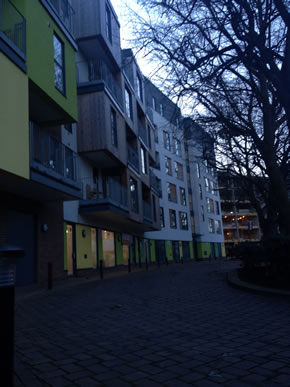Locals Object To New Secondary School In Chiswick
Say the site on Bollo Lane is not suitable for the purpose
|
Residents have expressed concern about a proposed new secondary school for Bollo Lane which is hoping to open in September this year and cater for students with learning challenges.
The Independent School at 2, Bollo Lane, wants to be in operation for the next academic year with a phased entry rising from 8-16 at first intake to eighty pupils aged 11-16 by the end of two years. It intends to be a non denominational co-ed school with particular emphasis on children who have been diagnosed with learning challenges such as dyslexia or AD/HD.

The community unit where part of the school would be located
A planning application has been lodged with Ealing Council. But residents who occupy the upper floors of the five-storey building say the site is not suitable for a school. The building is partly occupied by commercial units and a nursery and the residential area is divided into private and social housing. The One Housing Group is the current leaseholder. Local councillors have also expressed concern over the school proposal. The school principal has defended the chosen site (see statement below) and said it fits their criteria perfectly and is marketed for d1 useage which is required for schools.

Residents say noise will travel up to their flats
One resident said they had a range of concerns including noise, disruption during renovation, transport difficulties, lack of parking, and the general disruption of having a school consisting of 80 students and twenty teachers in a relatively small area with little outside space.
"The space wasn't designed for a school, it will need a huge amount of internal work including toilets, there's very little detail about disruption, rubbish collection is already under pressure. We feel sufficient time hasn't been given to finding a more appropriate business for these units", said the resident.Residents also say they were give insufficient notice by the Council, receiving letters on February 4 which were backdated to January 31.

Locals say the site is located by a busy road
A formal Planning Application is with Ealing Planning Department (PP/2014/0442) with a closing date for objections of 28/2/14. Local councillor Andrew Steed said that they had been in contact with locals who were worried about the plans.
"As ward councillors we would have concerns in three areas: the residents living in the block, issues for the wider area such as traffic and we would also question the suitability of the site for a school, e.g. lack of obvious play and sporting facilities', he commented.
The school founders have a background in special educational needs and have links with a well-known private school in Barnes. The new principal has commented:
"With regards to the site, the following were a top priority with regards to our selection:
-excellent transport links to support our aim of fostering our students to achieve independence beyond our doors
-proximity to green space
-to be a part of a local community in which our students can be positive and productive contributors
-modern, open space internal design
"The property on Bollo Lane fits criteria perfectly. It is also worth mentioning that the property was marketed for D1 usage (which is required for schools), including on the sign in front of the property. It was only when we got to sorting out the Heads of Term with the agent that we were told that, although marketed that way, the property didn't currently have D1 usage, but it used to.
"We are a very small school, by secondary school standards, with a very strong staff to student ratio of 1:4. This will provide our students with very a individualised and closely supervised, and ensure a strong, close knit school community."
The applicants say the school would be for children who have received specialist support during their primary school years, or who may have been home schooled and who would benefit from the smaller class sizes, individual learning plans and different teaching methods.
February 11, 2014